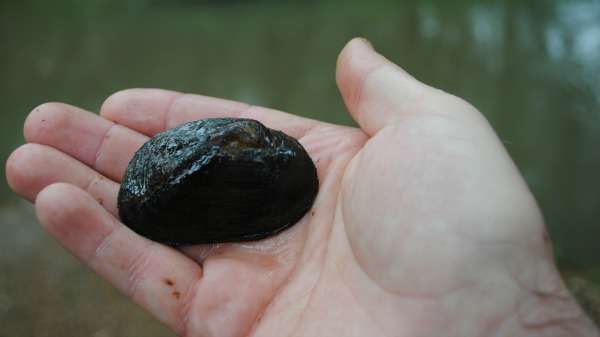Long-lived mussels disappear from half their range

The freshwater mussel Westralunio carteri has vanished from nearly half its former range, prompting the bivalves entry onto WA's threatened species listing.
Murdoch University adjunct lecturer Michael Klunzinger, along with Alan Lymbery, David Morgan and Stephen Beatty, assessed freshwater mussel populations at more than 400 sites from Gingin to Esperance.
They compared the presence of mussels in this search with historical records from museum collections and the WA Department of Parks and Wildlife from 1900 and the 1990s.
The comparison shows the mussels' range had plummeted by 49 per cent.
"They were still abundant in some areas where there was quality freshwater but in other areas they had disappeared," Dr Klunzinger says.
"This range decline is a big concern as it means we have lost populations and genetic diversity."
Dr Klunzinger attributes the shocking decline to secondary salinity.
Tree felling for agriculture and land development causes water tables to rise, bringing salt to the surface.
This is particularly problematic in the south-west where salty soils are dissolved and runoff surface water flows into streams, impacting freshwater and the creatures that live there.
The freshwater mussel is particularly sensitive.
Dr Klunzinger says field observations indicate W. carteri was almost never found at sites with saltier water.
This was corroborated by laboratory tolerance trials that showed that W. carteri cannot withstand water with salinity greater than about 3g a litre.
Dr Klunzinger says mussels can also be crushed by the trampling hooves of cattle as the livestock drink from freshwater sources.
The W. carteri decline is worst in the Wheatbelt, in which most of the landscape has been cleared for agriculture.
However, populations have also shrunk, or disappeared, at sites cleared for urban development.
The findings were backed by citizen science reports on Mussel Watch, a monitoring program in which residents could report mussel sightings onto a computer database.
Mussel larve hitch a ride on freshwater fish
Dr Klunzinger's research into the species—the only freshwater mussel in the south-west—also revealed fascinating lifestyle traits.
He determined newly hatched larvae known as 'glochidia' attach themselves to fish to prevent themselves being washed out to sea with the river—essentially hitchhiking a ride to remain in the freshwater.
Dr Klunzinger also determined this species can live for at least 50 years.
He says their listing as 'vulnerable' on the WA threatened species list will afford them extra protection.
Provided by Science Network WA


















